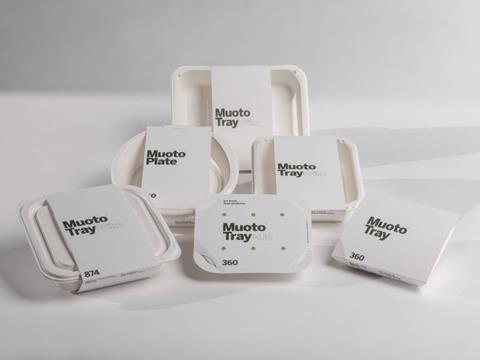
In line with an ongoing demonstration phase, Metsä Group will run a pre-engineering project to evaluate the feasibility of a commercial-scale factory for its Muoto wood fibre products – intending to offer renewable, recyclable alternatives to plastic food packaging.
Muoto’s production technology converts wet wood into three-dimensional packages without any intermediate steps. This apparently prepares the products, which already claim to offer a low carbon footprint, for a similarly low-carbon delivery process.
Since it is described as lightweight, strong, recyclable, and easy to mould into different shapes, Muoto is expected to apply to a range of food packaging formats. These include light takeaway and lunch packages, berry containers, trays, and combo packaging, although its product catalogue will be finalized once the EU Packaging and Packaging Waste Regulation is complete.
After the key phase of pre-engineering, Metsä Group is expected to have laid the foundations for factory planning. At this point, its innovation company, Metsä Spring, will consider factory investment and expects the process to be completed in early 2025.
It will consult the outcomes of pre-engineering and demonstration work – largely based at a unique demo plant in Äänekoski, Finland – to gauge the possibility of investing in a new business and supporting facility. It has already been decided that the factory would be based at its site in Rauma, Finland.
Veli-Pekka Kyllönen, Metsä Spring’s new project director, will lead the pre-engineering project and a team of five to ten experts. Recruitment for this team is still ongoing.
“Taking an idea to industrial scale is a long road with multiple different phases,” says Metsä Spring CEO Niklas von Weymarn. “Deciding to start the pre-engineering project is a big milestone for us.
“Although many areas still need further development, we have now gathered enough proof to initiate this very important factory planning stage.
“The Muoto project has reached this point very quickly, considering that the project started almost from scratch for us in 2020. A big thank you goes to our project team and our main partner Valmet.”
The news comes after Metsä Group commenced operations at its bioproduct mill and paperboard mill expansion in Kemi, Finland, last October. The mill claims to utilize zero fossil fuels and direct all raw material and production side streams into bioproducts or bioenergy.
Meanwhile, Metsä Spring previously led a €1 million seed funding round to develop and plan a demo production facility for FineCell. The company converts dry pulp fibre into an added-value biomaterial for thin and flexible films.
In another development, DS Smith announced a £48 million multi-year investment in a new fibre preparation line at its Kemsley paper mill earlier this year. The move is expected to deliver returns through improved efficiency and reduced costs.
If you liked this story, you might also enjoy:
Report: The ultimate guide to global plastic sustainability regulation
The Brief: Oxo-(bio)degradables: the who, what, and why of breaking down fossil-based plastics
Sustainable Packaging Summit: How Kraft-Heinz uses collaboration to drive innovation
The Brief: Using ocean-bound plastic in packaging – how, why and should we?














No comments yet